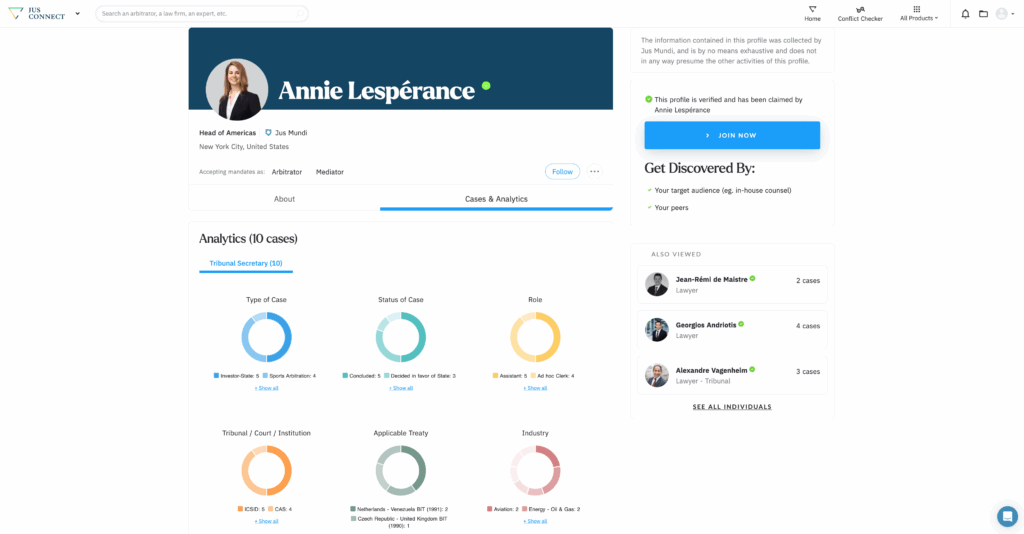THE AUTHOR:
Rida Ahmed, Marketing Manager at Jus Mundi
What if the most important decision in your arbitration happens before the case even begins?
Selecting the right arbitrator isn’t just a procedural formality; it’s one of the most consequential decisions you’ll make in any arbitration.
But when so much about an arbitrator’s track record is difficult to access or assess, you’re often left making a pivotal decision based on word-of-mouth and what you can piece together from public records. It’s a high-stakes judgment built on limited visibility, and one that can have lasting consequences for how your case unfolds.
Despite these limitations, there’s a great deal within your control. With the right strategy — and tools like Jus Connect, which bring transparency and data-backed insight into every stage of the process — you can dramatically increase your confidence in the selection process and reduce the risk of surprises later.
In this guide, we’ll show you how to take the guesswork out of arbitrator selection. You’ll learn how to define what actually matters for your case, evaluate candidates with data-backed confidence, and avoid the blind spots that can derail proceedings, all while moving faster and with greater clarity.
Start with the Arbitration Agreement
Before you dive into arbitrator research, make sure you fully understand the boundaries of what’s possible and what’s required. The arbitration agreement and relevant institutional rules don’t just guide your options, they can limit or even override them.
Here’s what to confirm:
- Number of arbitrators
- Appointment process
- Required qualifications – such as nationality, legal background and subject-matter expertise
- Institutional rules
Define Your Criteria
Once you’ve clarified the parameters of the arbitration agreement, the next step is setting your strategy: what exactly are you looking for in an arbitrator, and why? Prioritize the criteria that matter most based on the specific facts, risks, and dynamics of your case.
Here are key filters to consider:
- Nationality: Aim for neutrality by avoiding arbitrators who share a party’s nationality. However, in some disputes, particularly where cultural context matters, a shared background may help bridge gaps in interpretation or communication.
- Language & Cultural Fluency: If critical documents or testimony are in another language, or if parties are presenting in a second language, shared fluency can influence how effectively your case is understood and advocated for during deliberations.
- Governing Law Expertise: Select someone experienced with the relevant legal system, especially if it differs from the seat of arbitration. You want someone who understands that system; not just technically, but in terms of how it’s applied in practice.
- Subject-Matter Expertise: If your case involves technical, industry-specific issues (such as energy contracts or complex financial instruments), an arbitrator who understands the commercial realities of your sector can make all the difference in interpreting the facts and the contract. Arbitrators aren’t always lawyers by trade; many are engineers, accountants, or other subject-matter experts, and having a mix of legal and technical expertise on a panel can be invaluable in complex disputes. Use tools like Jus Connect to see what cases they’ve ruled on, what industries they’ve worked in, and what kinds of disputes they’ve handled.
- Procedural Experience & Style: Familiarity with specific institutional rules streamlines proceedings. Additionally, some arbitrators are strict on timelines while others are more flexible. Choose someone whose procedural philosophy aligns with your strategy, especially in fast-moving or high-pressure cases.
- Location & Availability: Arbitrator availability is often underestimated. But delays in scheduling hearings or issuing awards frequently stem from overloaded calendars. Factor in where they’re based, especially for in-person hearings so you can account for travel time and cost.
- Diversity: More in-house teams are pushing for diverse shortlists as broader perspectives often lead to more balanced deliberations and more credible awards. Consider gender, generation, and geographic diversity in your shortlists. Jus Connect can help surface qualified professionals who may be overlooked in traditional networks.
You can’t optimize for everything: is sector experience more important than speed? Is neutrality more critical than proximity? Making those trade-offs clear at the outset will keep your selection process focused and strategic.
Create a Confident Shortlist with Jus Connect
Building a shortlist manually is slow, fragmented, and often based on incomplete information. You’re juggling spreadsheets, PDFs, scattered bios, and relying on what you can find through public records. The result? You risk overlooking critical insights in one of the most consequential decisions of your case.
Once you’ve defined your criteria, the next step is narrowing your longlist down to a confident, data-backed shortlist. You’ve already answered “Who qualifies?” Now you’re answering “Who’s the right fit?”
This is where Jus Connect can supercharge the process. Jus Connect is the world’s first and most comprehensive professional network built specifically for arbitration professionals. It’s not just the size of the network — over 68,000 arbitrators, counsel, tribunal secretaries, and experts — that makes it unique, but the depth and accuracy of the data behind every profile. Every data point is verified and powered by the same legal intelligence that underpins Jus Mundi, giving you unmatched confidence in who you’re appointing.

Here’s how to go deeper (and how Jus Connect can help at every step):
- Review their prior decisions and case history: Look at how each arbitrator has ruled on issues similar to those in your case. Are they strict interpreters of contractual language? Have they dealt with similar industries or legal principles? Prior rulings can reveal patterns that may align or clash with your case strategy. Jus Connect makes this easy with verified case histories linked to each profile, so you can spot patterns and align your shortlist with your case strategy.
- Assess procedural decisions and efficiency: With Jus Connect, you can check how quickly arbitrators have issued awards, how often they’ve extended deadlines, and how they handle procedural issues. These details impact cost, timing, and predictability.
- Evaluate damages and quantum patterns: Consider how an arbitrator has handled quantum in prior decisions. Are they generally conservative or generous? Do they show a pattern of deferring to expert evidence or discounting it? Jus Connect provides insight into these patterns, helping you anticipate potential outcomes and build a balanced panel.
- Check for prior appointments and challenges: Has the arbitrator been repeatedly appointed by one type of party or firm? Have they faced past challenges? While a challenge doesn’t automatically signal bias, a pattern of controversy might warrant further scrutiny, especially for high-profile or politically sensitive matters.
- Run a conflict check early: Has the arbitrator been repeatedly appointed by one type of party or firm? Don’t wait until you’ve made your selection to assess potential conflicts. Jus Connect’s Conflict Checker can quickly surface overlapping relationships saving you from surprises or late-stage rework.
The result is a shortlist you can stand behind and share with confidence. Whether you are in-house counsel validating outside counsel’s recommendations or a law firm delivering a defensible list to your client, Jus Connect provides the transparency and insight you need to make smarter, faster, and more reliable appointments with confidence.
Turn Arbitrator Selection into a Strategic Advantage
Arbitrator selection isn’t just a procedural step — it’s a strategic decision that can shape the entire trajectory of your case. The choices you make at this stage can impact timelines, costs, and even how arguments are interpreted once proceedings begin. Taking the time to define your criteria clearly, look beyond surface-level bios, and analyze past patterns of decision-making will give you a stronger foundation for the case ahead. By combining this preparation with data-backed insights, you can approach the process with confidence and avoid costly surprises.
Jus Connect gives you the clarity and efficiency you’ve been missing. In just a few clicks, you can uncover the right arbitrators and experts, backed by case-verified profiles, conflict checks, and insights you can’t get anywhere else.
See for yourself how much easier and faster the right selection process can be. Take a tour of Jus Connect today and set your next case up for success.
Enhance Your Visibility with Jus Connect
Jus Connect offers a unique opportunity for firms to amplify their professional presence in the arbitration community. By optimizing your profile, firms can significantly boost their market visibility and engage effectively with their target audience, particularly in-house counsel.
Our dedicated concierge service is committed to assisting firms in highlighting their unique attributes and successes. Enhance your firm’s market position and development strategy by connecting with us here.
For questions and queries, please contact Hanh Huynh, Head of Jus Connect, at [email protected].





